There are many things we can do to liberate ourselves, and each other, from the tyranny of government. Unfortunately, for generations, we have been educated to believe we are powerless. Supposedly our voice can only be heard through the ballot box, through our extremely limited ability to lobby and through whatever protests we are allowed.
This is a deception. We have all the power, government has none and we can change the world whenever we choose.
All we need to do is realise our collective agency and strength. The good news is that if we consistently work toward freedom, achieving it is a nailed-on certainty. The bad news is that very few of us are even aware of the need to change our behaviour and fewer still know how to do it.
Our broad lack of awareness leaves us at the mercy of those who do understand how to misuse behaviour change techniques and applied psychology for nefarious purposes. This mistreatment has led a sizeable minority to rail against applied behavioural psychology. Yet, should we decide to use these strategies ourselves, the potential for positive social change is immense.
This article is written in the hope that we can all learn how to use behaviour change techniques for our benefit. Behaviour change is a skill that can be learned and, with practice, become a powerful tool for personal development. We can use it to defeat the plans of those who would use it against us and construct a free society.
The Misuse Problem
Over the last two years we have experienced, and are continuing to endure, a global behavioural change programme designed to force us into compliance. Psychological operations (psyops) have been used to adapt our behaviour to a so-called “new normal.” One of the objectives is to condition us to respond automatically to an announced crisis, whatever it may be, and to obey government commands.
This isn’t a contentious point. Applied behavioural change techniques are common practice at both the world governance and national government level. The World Health Organisation outlines how it interprets the use of these techniques:
“A health campaign follows a specific sequence that moves the target audience from awareness of an issue towards a behaviour resulting in a specific health outcome. [. . .] Presenting a consistent message from multiple sources increases the likelihood of action. [. . .] Trusted messengers and high-profile personalities can add their voices to the campaign.”
In February 2020, one month before it declared a global pandemic, the WHO announced the creation of its Technical Advisory Group (TAG) on Behavioural Insights and Sciences for Health. The group is chaired by Prof. Cass Sunstein and its members include behavioural change experts from the World Bank, the World Economic Forum and the Bill and Melinda Gates Foundation. Prof. Susan Michie from the UK is also a TAG participant.
Cass Sunstein co-authored a 2008 paper titled Conspiracy Theories in which he and Prof. Adrian Vermeule advocated a series of psychological methods to counter the arguments of people who doubt official narratives. Sunstein and Vermeule ruled out engaging in logical, evidence-based debate. Instead, they proposed a concerted psyop campaign to discredit anyone who questioned the government.
TAG soon published Principles and Steps for Applying a Behavioural Perspective to Public Health, which identifies six principles to be utilised. Deciding that knowledge was “often not enough to change behaviours,” TAG implemented a different methodology. Noting that the behavioural choices we make are “influenced by the environment in which an individual resides and makes decisions,” TAG concluded:
“Approaching public health from a behavioural perspective requires focusing on people and their behaviours in the context in which those behaviours occur. [. . .] Behaviours can be defined so that the influences on those behaviours in terms of barriers and drivers can be diagnosed. The strategies and interventions that can change those behaviours can then be designed.”
No mention of consent was made anywhere in the document. TAG advocates manipulation of the context in which behaviours occur. This enables TAG to design the behavioural response. We are the subjects of these efforts, and TAG doesn’t consider either our knowledge or consent to be relevant.
Susan Michie is also a member of the UK government’s Scientific Advisory Group for Emergencies. SAGE has provided much of the “evidence” the UK government used to justify its anti-scientific response to the pseudopandemic. Michie is also a leading member of the SAGE behavioural change subgroup, Spi-B.
Like her fellow TAG and Spi-B behavioural change experts, Michie favours psyops over logical discourse. In an advisory report, dated 22nd March 2020, SPi-B recommended that the UK government engage in a media-led terror campaign to coerce the public into pseudopandemic compliance:
“A substantial number of people still do not feel sufficiently personally threatened. [. . .] The perceived level of personal threat needs to be increased among those who are complacent, using hard-hitting emotional messaging. [. . .] Some people will be more persuaded by appeals to play by the rules, some by duty to the community, and some to personal risk. All these different approaches are needed. [. . .] Use media to increase sense of personal threat. [. . .] Consider use of social disapproval for failure to comply.”
Government in the UK and in other countries deployed precisely this methodology with the assistance of their mainstream media partners. This was a continuation of the manipulation proposed in the UK government’s 2010 document, MINDSPACE. That report outlined how government could misuse behaviour change for propaganda and compliance purposes.
It stressed the importance of avoiding any discussion of the evidence and focused on overcoming peoples’ rational minds using psychological manipulation. Notably, this manipulation could be achieved without the subjects (us) even being aware that we were effectively being programmed:
“People’s behaviour may be altered if they are first exposed to certain sights, words or sensations. [. . .] [P]eople behave differently if they have been ‘primed’ by certain cues beforehand. Emotional responses to words, images and events can be rapid and automatic. [P]eople can experience a behavioural reaction before they realise what they are reacting to. [. . . .] This shifts the focus of attention away from facts and information, and towards altering the context within which people act. [. . .] Behavioural approaches embody a line of thinking that moves from the idea of an autonomous individual, making rational decisions, to a ‘situated’ decision-maker, much of whose behaviour is automatic and influenced by their choice environment. [. . .…] [C]citizens may not fully realise that their behaviour is being changed — – or, at least, how it is being changed.”
This approach utilises the covert psychological strategies suggested by Sunstein two years earlier. Spi-B and TAG were among those who exploited the strategies throughout the pseudopandemic. Combined with wide-reaching censorship and a concerted media propaganda campaign, the objective was to hide or otherwise obfuscate evidence and move people away from rationality towards becoming “situated decision-makers.”
Programmed to accept a tightly defined set of limited discussion points, people were coerced into believing in a predetermined “choice environment.” The context and extent of their decision-making was thus controlled, leaving many subjects psychologically disabled. Once the choice environment had been established, behavioural responses could then be designed without any resistance from the situated decision-makers.
This form of brainwashing primarily targets the subconscious. It is highly effective because it leaves the subject imagining they have free choice or free will. This deception renders us far more likely to behave as instructed. However, in reality, our behavioural options are restricted to the desired outcomes only. The behavioural commitment of the subject is engineered by their situated position within the choice environment.
Misusing behavioural change techniques and underpinning them with applied psychology is totally unethical. It is a form of psychological abuse that was and still is inflicted upon the global population to push an agenda.
In the UK, such psychological abuse prompted a concerned group of psychologists and therapists to urge the British Psychological Society (BPS) to investigate the abuse and issue a statement. Eventually the BPS replied with what many considered to be an evasive, disingenuous and wholly unconvincing response.
Given the activities of TAG, Spi-B and others, strong opposition to this psychological manipulation by government is understandable. It is essential that we draw a distinction between covert, unethical misuse of behavioural change and appropriate employment of these strategies.
Utilised as part of talking therapy, behaviour change (or modification) it is perhaps the most powerful technique for the treatment of many unwanted, self-destructive behaviours. It has helped millions of people around the world overcome addiction and provides us with tools we can use in our daily lives to achieve a wide range of goals and objectives.
For example, if freedom is our aim, we can use the skills we learn from Acceptance and Commitment Therapy (ACT) to live as free, sovereign human beings. If enough of us do so it is inevitable that we will create the free society most of us want. We do not have to live under the tyrannical oppression of any government that seeks to control us through brainwashing and fear.
Acceptance And Commitment Therapy (ACT)
Developed in 1986 by Prof. Steven C. Hayes, Acceptance and Commitment Therapy (ACT) helps us notice the thoughts and experiences that lead us to adopt potentially destructive behaviours. Once we have acknowledged and accepted the reality of our current condition, we can identify the associated behaviours, develop better coping strategies and commit to behavioural change.
In Get Out of Your Mind & Into Your Life Hayes described how our thoughts, feelings, and physical sensation can lead us behave in a way that compounds our suffering. Demonstrating that it does not have to be this way, he outlined how we could instead use our own behaviour to overcome our multifaceted problems and progressively move towards the best possible life:
“To put it bluntly, human beings are playing a rigged game in which the human mind itself, a wonderful tool for mastering the environment, has been turned on its
host. [. . .] Ultimately, what ACT asks of you is a fundamental change in perspective: a shift in the way you deal with your personal experience. [. . .] the role of these problems as barriers to living can be changed. [. . .] These new approaches can change the actual substance of your psychological problems and the impact they have on your life.”
We can use the ACT matrix as a mental map to guide us away from damaging or life-limiting behaviours and instead actively choose behaviour that moves us closer to our goal. This is depicted in the diagram below. When we are first learning ACT, the diagram can be carried on our person as an aide-mémoire. However, once we are familiar with applying ACT in our daily lives, the simplicity of the model allows most of us to visualise it when needed.
Each of us perceives the world through our senses. In other words, our senses enable us to build a mental picture of reality. However, beyond our five senses, we can have thoughts, emotions and physical sensations that impact our perception.
Take, for example, a forest walk. The sights, sounds, smells, textures and even tastes form our appreciation of nature and thus our experience in nature. However, if while we are walking we start to feel the uncomfortable sensation of substance withdrawal then, despite the evidence of our senses, we will likely perceive the forest as a dark prison that is preventing us from getting to the substance we desire.
Our mental experience does not necessarily reflect reality. Other “unwanted stuff,” such as cravings or fear, often gets in the way. When they do, we can easily become “situated decision-makers.”
Unable to cope with our internal conflicts, we often resort to behaviours that are driven by these unwanted thoughts, emotions, physical sensations or beliefs. We respond to them instead of to the present reality of our environment or condition.
These behaviours, such as problematic substance use, can be fatal. The behaviours themselves can compound the unwanted thoughts, emotions, and physical sensations. We may enter the cycle of addiction, where physical changes and altered brain function can occur, further compelling the destructive behaviour.
ACT teaches us that the first thing we need to do is pay attention to the here and now. Our reality is formed through both physical and psychological influences, and we need to be “mindful” of both. The ability to root ourselves in awareness of the “here and now” can be improved by practising mindfulness exercises.
The objective is not to sit in mindful contemplation but to develop self-awareness skills. Our capacity to focus upon what is happening to us in any given moment will afford us self-control.
For example, we might improve our awareness of the conflict between the tranquillity of a forest walk and our craving for a drug. Both can be perceived simultaneously and the difference noted. The craving is an uncomfortable sensation, but that discomfort need not alter our comprehension of the forest.
Eventually, we are able to identify the difference between external reality and internal distress. In this awareness we can start to address the resultant behaviour that is driven solely by our personal experience. We can no longer blame the forest (our environment or other people) for actions that are our own responsibility.
The next step in ACT is acceptance. It is pointless pretending that we are not experiencing cravings, emotional distress or physical pain when, in reality, we are. Trying to deny these experiences, whether psychosomatic or caused directly by physical stimuli, simply increases our anxiety, often heightening our discomfort.
If we accept what is happening to us, we can confront it. If we deny it, we cannot ever confront it.
When we don’t pay attention to the “here and now” it is very easy for us to automatically adopt learned behaviours based upon misconceptions—especially if we use them as coping strategies whenever we encounter a trigger. Noticing is the key to unlocking behavioural control.
Let’s say we cope with stress by drinking alcohol. Every time we are in a stressful situation we increase the chance of drinking more because we wrongly believe that is our only option or that the behaviour carries no risk. For most people this isn’t a problem, but for others it can become life-threatening. If stress is a trigger, ACT teaches problematic drinkers to notice what causes them stress and to notice the signs of being stressed as they emerge.
Once able to recognise the risk, as it is occurring, problematic drinkers become aware of behavioural choice. They can rely upon a behaviour which they know to be harmful or they can use a different coping strategy that is less harmful or hopefully causes no harm at all.
ACT is about awareness of reality. If drinking chills you out in the moment, then whatever behaviour you choose to use as a coping strategy also has to work in that moment. Otherwise it isn’t a real choice. Someone who is alcohol-dependent, having completed detox and achieved recovery, may choose to listen to music, exercise, read, pray or cook instead of drinking. Whatever behaviour is used, all that matters is that it works and moves the recovering alcoholic towards a chosen goal.
ACT empowers people to gain control over behaviour that can either move them away or toward what is important to them. They do this through commitment to behavioural control. However, just as ACT demands that behavioural choice is real, so it requires a genuine appraisal of what matters to us.
Perhaps substance misuse has broken relationships, led to health problems or endangered an individual by repeatedly placing him in high-risk situations. If that’s true, it’s pointless pretending that relationships or health or safety matter more to him than does using or drinking. There is little chance of someone moving away from harmful behaviour if he has nothing better to move toward.
For many people who use ACT, this is perhaps the most challenging aspect. The moment they accept that their self-destructive or damaging behaviour matters more to them than anything else in the world can be an extremely painful realisation. It may be the first time they have truly confronted the stark reality of their addictive behaviour.
This is a very high-risk moment in the recovery journey. Relapse into self-destructive behaviour is a strong possibility.
ACT requires hard work and commitment. Hopefully, with the support of a decent therapist or psychologist, the individual can be afforded the safest possible opportunity to revaluate his life. This is no easy thing to do, as anyone who has been through it will attest. The majority of us are able to be honest with others most of the time, yet we struggle to be honest with ourselves.
Once this work is complete, the recovery journey can continue. Many ACT users realise that their problematic behaviour is harming them and choose to readjust their priorities. They accept that their behaviour constitutes self-harm, and they find new meaning based upon what is truly important to them.
They can set a goal that motivates them to change their behaviour. It doesn’t really matter what the objective is. It could be rebuilding family relationships or their health or their career or even a broken bond with a pet. Or, when the behaviour has led them into the judicial system, the goal could be simply a commitment to freedom from prison.
Every moment of our lives is filled with our behaviour, for good or ill. Behaviour can lead us either away from or toward whatever is important to us. ACT empowers individuals to recognise the risks inherent in the behavioural choices they have made. Rather than automatically responding as situated decision-makers, they can use the tools they have acquired from ACT to regain their autonomy and make rational behavioural decisions based upon their knowledge, values and objectives.
How to Use ACT To Free The World
In light of the activities of TAG and Spi-B and other institutions, we must confront the reality that our governments do not serve us. They merely play a policy enforcement role in a worldwide network we can call the Global Public-Private Partnership (G3P).
Governments not only do not serve us, they seek to control us using covert brainwashing techniques, “designing” our behaviour, and enslaving us instead of ensuring our freedom. When governments act against our interests it is, more often than not, at the behest of the G3P.
The obvious deceit and disinformation that characterise the G3P’s pseudopandemic has led an increasing number of people to recognise the tyranny of our governments. They can now see that governments—whether national, state, provincial, or local—exist for the purpose of regimenting every aspect of our lives on behalf of their G3P partners.
At present governments around the world are busy backpedalling on their outlandish claims regarding every aspect of the fake pandemic. It won’t be long, however, before they roll out the next fear-inducing psyop. And the next and the next. Their command over most people will be permanent unless and until more of us awake to the subtle and manipulative nature of these perpetual psyops.
From censoring the internet to attempting to ban all protest, from forcing us to take drugs we don’t want to surreptitiously deceiving us into accepting digital identities—a psyop we have consistently rejected in the past—from removing early, inexpensive, and effective treatments to removing our so-called human rights whenever convenient, governments throughout the “free world” are making it ultra-clear that our alleged representative democracy is being dismantled and replaced by dictatorship.
We imagine that the only ways we can change government are to lobby, to protest, to elect or appoint new officeholders and to remove incumbents. These actions are largely futile, though, if we are counting on “our” political party to prevail and to fix what’s wrong. For the problem is not the parties that form government—although the party political system is an obstacle in and of itself. Rather, the problem is that whichever party forms government serves the G3P regardless.
As an analogy we might see the election of a politician (or political party) as a vote for a new office manager. All we can do is choose our immediate boss. The manager’s loyalty is to the company not the staff team he or she manages. Their role is to ensure we are working towards the company’s goals. We have no say over the direction of the company and neither does the manager.
We elect politicians and parties but we never vote for the behind-the-scenes people who control our political representative or favoured party. Their only role is to ensure we work towards the G3P agenda. We have no democratic control of the G3P agenda and neither does the politician.
Faced as we are with a global network of multinational corporations, think tanks, governments, NGOs, and philanthropic foundations, not to mention a mainstream media industrial complex propaganda machine that is beholden to the G3P, it can feel like we are powerless to resist. But we are not powerless. The belief that we are is itself an illusion.
The truth is that the whole apparatus of state has been created to oppress us precisely because those who benefit from it realise that they themselves are ultimately powerless against us! Once we collectively decide to act, the G3P cannot win, no matter how much they fight to retain their authority.
But how, you might be asking, do we ever muster the collective will? The answer: All we need to do is take action as individuals. When enough of us quit believing that government can control us, when enough of us stop complying to its demands, the multiplying effect of our actions will change the world. It is inevitable.
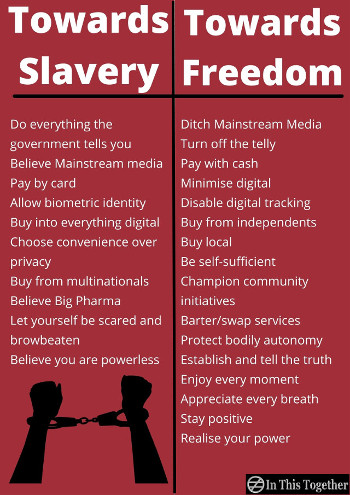 Yes, protests, legal challenges, lobbying, sharing information and campaigning for issues we care about are all valuable steps to take if we want to be free. But, in order to change the world, what we really need to do is change our own behaviour. Instead of doing the things that move us away from freedom in our own lives, we need to consistently do the things that move us toward it.
Yes, protests, legal challenges, lobbying, sharing information and campaigning for issues we care about are all valuable steps to take if we want to be free. But, in order to change the world, what we really need to do is change our own behaviour. Instead of doing the things that move us away from freedom in our own lives, we need to consistently do the things that move us toward it.
Though often misquoted, Mahatma Gandhi explained this process eloquently:
“We but mirror the world. All the tendencies present in the outer world are to be found in the world of our body. If we could change ourselves, the tendencies in the world would also change. As a man changes his own nature, so does the attitude of the world change towards him.”
We can make this change by using ACT. If freedom is what matters to us, then we must persistently behave in a way that moves us toward it. Equally, we must stop behaving in a way that moves us away from freedom.
This requires that we notice what is happening in the “here and now.” Is there a difference between our own thoughts and emotions and the reality surrounding us?
We may notice that everyone around us is wearing a mask, reinforcing to us the visual cues that suggest danger. Our fear of that unseen danger could be the emotion that drives our behaviour—and cause us to don a mask. We must accept both the physical reality of our environment and the psychological state of fear we may be in.
Understanding the “here and now” and armed with ACT principles, we can overcome our fear and commit to what is important to us in that moment. We must ask ourselves which direction our behaviour will lead us—not might, but will, lead us. We have a behavioural choice and, if we want to reach our goal, we must act accordingly.
If we choose to behave in a way that moves us away from freedom, we will eventually lose our freedoms and move closer to tyranny. If we choose to behave in a way that moves us toward freedom, we will be one step closer to it. The cumulative effect of all these behavioural choices will, depending on their direction, be either freedom or tyranny.
We have previously discussed the kind of solutions we might pursue. With these in mind, we can use ACT to steadily move toward freedom.
Take this example. We know that the G3P intends to introduce Central Bank Digital Currency (CBDC). It is no coincidence that the pseudopandemic has been very helpful steering us toward the CBDC model by coaxing us to further reduce our use of cash. We also know that the central banks plan to treat CBDC as a liability on their books. That means they will be responsible for covering their liabilities—with their own money. Thus, when CBDC is introduced, the central banks intend to literally own all the money, leaving us with no money. Ipso facto: We won’t be able to own anything.
CBDC will be programmable money, meaning that all our transactions will be monitored and controlled by our nation’s central bank. We will no longer be free to choose what we buy or with whom we transact. A CBDC world represents nothing less than 100% global monetary slavery.
The disappearance of cash will more easily facilitate the introduction of CBDC. Therefore, if freedom is important to us, we must not let cash disappear. In fact, we need to make cash indispensable to businesses across the world.
Using ACT, whenever we make a purchase or other transaction we must ask ourselves if our behaviour moves us toward or away from freedom. While it is not always possible to use cash, we must use it wherever and whenever it is possible if we want to move toward freedom. If a store refuses to accept cash, don’t frequent it. Instead, choose a store that does. Doing so will move us closer to freedom.
In so many aspects of our lives we are subjected to an unprecedented mainstream media propaganda campaign. Paying our TV license in the UK and buying mainstream media rags, either print or online, are acts that move us away from freedom. To counterACT that trend, we can consider what other behavioural options would better suit our objective of freedom. When we need an update on current affairs, we can choose to buy an alternative media publication or go to free online news sources. Choosing to support the independent media moves us toward freedom. Not incidentally, we will probably also be better informed, which helps us move away from tyranny.
Another way to move toward freedom is to use ACT when deciding where to buy goods and services. If you hand over your hard-earned money to multinational G3P corporations, does that move you away from or toward freedom? If the former, don’t do it. Instead, spend your cash with local traders and small businesses. Or barter and exchange goods and services wherever possible. This maintains and increases choice and is a step toward freedom.
The G3P agenda is to centralise all authority at a global level. Centralisation of authority moves us away from freedom. Therefore, don’t simply obey the edicts of global authority. If it is possible to disobey, then always disobey on principle. This moves us towards freedom and away from tyranny.
There is a never-ending list of behavioural choices we make every day that can either move us away from or toward freedom. If freedom matters to us and we persistently make choices based upon “what is important to us,” we will help create a global demand for freedom. If we do this in sufficient numbers, demand will be overwhelming, ultimately ensuring that we live in freedom.
Making decisions that favor freedom is not going to be easy in today’s climate of G3P tyranny. Acting in ways that defend freedom will be far less convenient and will require more effort than simply going with the flow. But what is the alternative? Relying on self-destructive behaviours will only lead us into more and more tyranny. It cannot be otherwise.
Ultimately, it all comes down to what you believe and what is important to you. If you value freedom then you must actively choose behaviours that lead you to freedom.
Once you are familiar with behavioural change principles, using them can quickly become second nature. While constantly checking your own behaviour can feel cumbersome or even irritating to begin with, stick with it. In no time at all, you will master your behaviour and forge a path toward freedom.
Not only can we build a society based upon the principles of freedom but, if we each take personal responsibility for our own behaviour, we will build it.

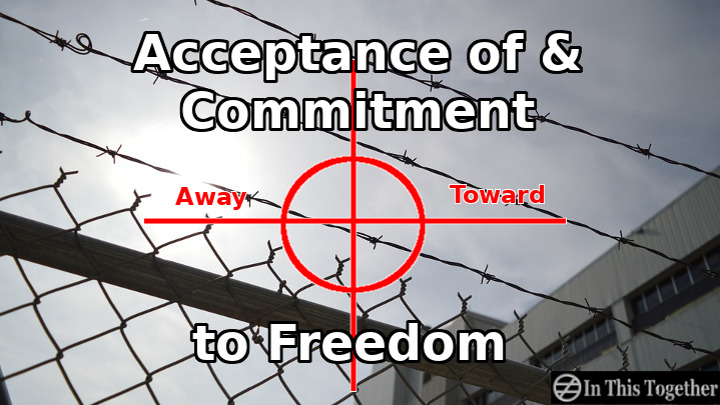
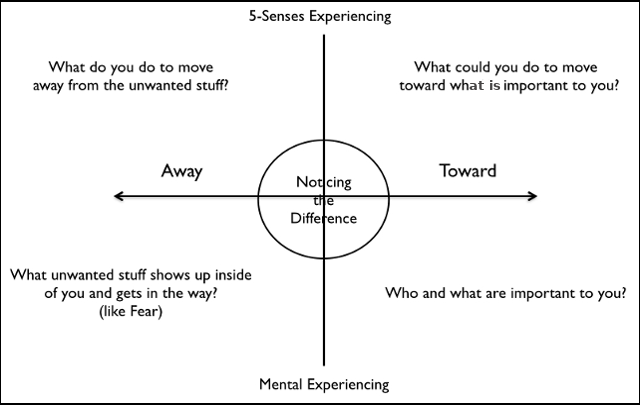
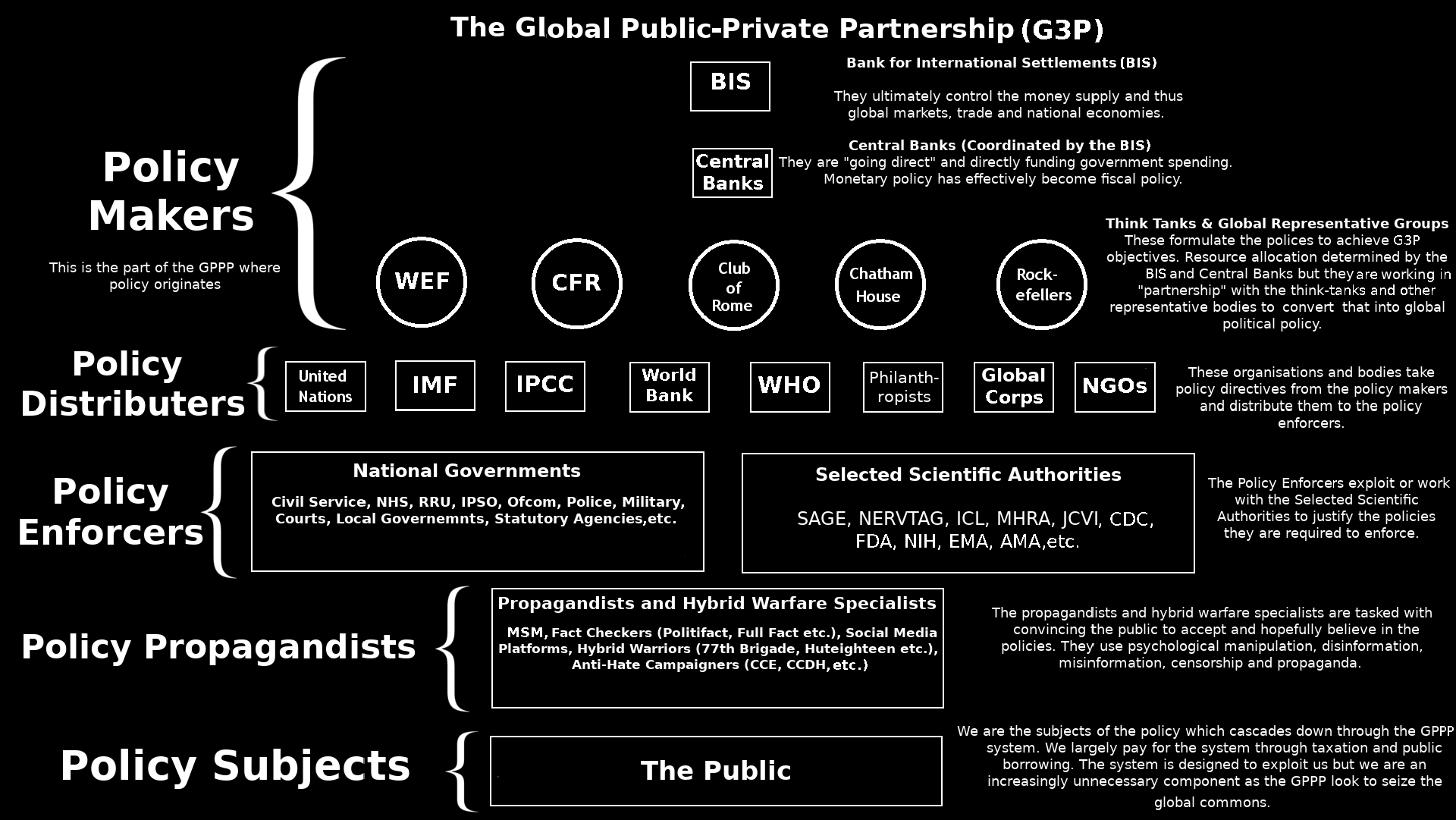

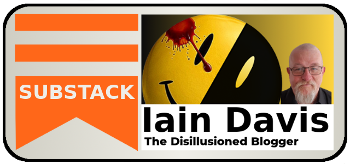





Keeping the “essential” liqueur stores open throughout the entire pseudo-pandemic while closing and limiting people’s access to worship and community congregation was effective in swaying the masses from “rational decision makers” to the “situated decision makers.” Love your work Iain and share on all the platforms! Bests from Texas
We, the voters, decide who gets employed as a politician by voting
We, in paying tax (even if it is VAT), pay the salaries of the politicians
That describes voters as the employers of the politicians
DIRECT DEMOCRACY is a government system that ensures accountability to you, the voter!
Never again vote for a politician that is not accountable to the voters
The South African constitution and political system is considered one of the best in the world but worse than other constitutions in some of its content and application.
– The system lacks in accountability of politicians to the voters.
– The primary allegiance of proportional representation politicians is to their political party and not to the voters!
– Many ward councillors see their political party as their first allegiance, not the voter in the ward, the employers of the politicians.
– The President has too much power
Our system is effectively a 5-year dictatorship
We, the voters, are
– The legitimate shareholders of South Africa, our province and our local government.
– The employers of our politicians.
As such, voters should have control over politicians and accountability of the politicians to the voters.
A direct democracy system is where laws are passed with the electorate in final control, if they decide to exercise that right through referendum, the voters will attain accountability of the politicians to the voters.
You can make a difference:
Present the document below to each candidate councilor and political party, negotiate the terms and insist they sign to show their commitment to direct democracy.
I, (name of candidate councilor or political party), email____________________website_________________________telephone________________________
Recognize that I am effectively an employee of the voters
Recognize that the voters pay my salary through payment of taxes and rates,
Recognize that the current system does not put the voters in control and therefore I:
– Commit myself to regular and effective consultation with the voting public through public meetings and continuous communication via the press, radio stations or in person.
– Will only vote in accordance to the best interest of the voters who elected me, who may be polled by means of a referendum similar in format to that used for petitions.
– Will ensure that the wishes of my constituency are effectively communicated and advocated for, in and at all levels of government.
– Will apply my total energy, ability and powers to uphold the laws and ensure that voters receive efficient and effective service deliveries.
– Am, and will remain accountable for my performance to the voters only.
– Fully agree that the registered voters of my ward may remove me from office (excluding proportional representation). A petition of 25% of the number of voters who voted in the last election within my ward is needed to effect my removal.
– Accept that all registered voters are free to sign the recall petition, including those who did not vote in the last election. The recall petition may only be initiated after 6 months have elapsed since the last election.
– Understand that, should an election be called, the recall process will be cancelled.
– Will promote legislation at all levels of government and changes to the South African Constitution in order to realise a system of constituency with top up proportional representation, recall, referendum initiative and Direct Democracy.
– Will declare any documents that I have signed with the political party and send the scanned documents to the email below
– Should I no longer reside in the ward, I will resign
– will send the scanned signed contract to the email [email protected] for display on the website http://www.directdemocracy.org.za for the voters to examine
Signed (candidate or political party)
How would you react if I applied to you for the following job?
You will pay me R 45000 per month, plus benefits
The job is part time
I am guaranteed employment for 5 years
If you instruct me to do something, I can ignore you
I can do exactly the opposite of what you instruct me to do
If I do agree with you, I must get permission from my labour broker (political party) to do what you say
Would you employ me?
If all the contracts for the employees were similar, would your company survive?
If you voted in the local government elections, you did employ someone under similar conditions
Political parties should be funded from the fiscus. There should be no charge for registering a political party and individuals or parties contesting elections. Simply a minimum number of voters signing a support document for the elections
One way to get the income of the masses up is to link the politicians’ salary to the average income of the lower 80% of the population excluding government employees and including the unemployed
PLEASE ACT TODAY AND REAP THE REWARDS TOMORROW.
“A society grows great when old men plant trees whose shade they know they’ll never sit in.” Greek Proverb
A nation of sheep creates a government of wolves
Jim Powell 0825712856
Important links: http://www.swissinfo.ch/directdemocracy/how-to,
http://www.swissworld.org/media/political_system/htdocs_en/index.html
Thanks Jim for a very informative comment.
Thanks Iain.
Another good technique of mindfulness can be found here:
https://www.headless.org/english-welcome.htm
No bullshit, just pure simple logic.
‘Must’?
Based on ‘old-fashioned’ courtesy, not ‘new-fangled’ psychology, I habitually do my own thing in my own way.
Not ineffectual. As life is a continuum, not digital, each action inevitably affects the whole. All have multiple effects to consider as ‘what ifs.’
Those I rate as ‘right thing’, I help; those as harmful to others, I undermine. I do not ‘always disobey’; I choose, using my own set of principles.
‘Alternate’ media gives its side of story. I consider both sides and decide which, if either, I agree with and to what extent. Both is more than either.
Many mundane, fascinating-to-discover reasons people wear masks e.g. Hide evidence not shaved that morning. Marital peace and quiet with chatter-box.
Psychology is not science. It’s pseudoscience, like eugenics and historically been tangled with eugenicists as have economics and other G3P ‘skills.’
I’ve given examples in previous posts of what I’ve been doing since early Feb 2020 and my rationale for my actions.
‘Coals to Newcastle’ is unwelcome and the ends do not justify the means: it’s the ‘how’ and ‘why’ that are important, not the ‘what’.
Very difficult to critique own motives and impossible to unearth them all from inside ourselves.
Thus, question remains: – How sure are we each if we do same as psychologists, we’re not also being tyrants trying to control others, enslave them?
Is changing others’ behaviour real objective, cover-story freedom? If you do as I say you’ll be free (coercion), if you don’t you won’t (threat) – MSM?
‘Old-fashioned’ – doing own thing in own way whilst trying to not cause harm. Personal responsibility to ‘walk gently through life’; full-time, life-long task.
What others do is their job.
If we make all others drive our way despite not all same skill-level, inevitable crash caused by who? Who initiated it, made first move?
And, adapt way or blame fog?
Each individual World-over genetically mostly the same and also a bit unique. Thus, what’s safe for one, will not be so for all. Changing other’s behaviour may be detrimental to their well-being.
Is that what really, underneath it all, want? Feeling angry, retaliatory about feeling not free to do as want? What’s stopping ‘free’, except personal choice?
The questions are ruthless but our private answers aid self-control.
Achieving self-control requires years of practise early childhood on. First target: reliably dry 24/7 by 2 years-old. Why ‘dry-nights’ stuff now for 11-year-olds?
Courtesy includes values assessing first step (right thing to do?); psychology only does second step (do it right), a very inadequate substitute.
I’ll keep trying ‘live and let live’ with courtesy’s values; I rate them, not merely above value of all money in World, but even above that of my lif
ACT & etc are obviously in the right ‘direction’.
Mistaking thought for knowledge can induce us to seek what will hurt us and flee truth – simply because of being framed in mis-taken associations.
Marshal Rosenberg’s ‘Non Violent Communiction’ (ie communication without tyranny).
Not as a merely conflict solving, but as a basis of cultural coherence in which problems no longer operate as pathogenic entities.
Scott-Peck’s ‘Community Building’ (See The Different Drum). Where the quality of shared presence called ‘community’ is both a transient awareness of a deeper context, as well as a basis for seeking to regain, restore or attain such a wholeness in some other moment by changing others or becoming someone other than is actually livingly so.
David Bohm’s Dialogue (On Dialogue) as the willing engagement, participation and transformation of ‘dialogue’ in which cultural value reveals itself through the awareness and release of our blocks.
We shall not cease from exploration
And the end of all our exploring
Will be to arrive where we started
And know the place for the first time.
Through the unknown, remembered gate
When the last of earth left to discover
Is that which was the beginning;
At the source of the longest river
The voice of the hidden waterfall
And the children in the apple-tree
Not known, because not looked for
But heard, half heard, in the stillness
Between the two waves of the sea.
Quick now, here, now, always–
A condition of complete simplicity
(Costing not less than everything)
And all shall be well and
All manner of things shall be well
When the tongues of flame are in-folded
Into the crowned knot of fire
And the fire and the rose are one.
Little Gidding V, – T.S. Eliot
Thank you for this helpful information. I arrived here and have ordered the book after hearing Ian and James Delkingpole recently on Dellinpod.
Thank you at last I am finding the answers
You are most welcome Christine.
Iain. Your chart on Public/Private Partnerships has been widely admired and it is excellent.
Unfortunately it is not reproducible and the printing is far too small to even begin to decipher.
Is there any way you could re-hash this and make available in PDF form that is readable
and re-producible? Many Thanks
Graham Wood
Hi Graham here’s the link to the full size image: – https://iaindavis.com/img/G3P-Big.png
Iain, Thanks for posting the full size image but the link doesn’t work for me. Has it been taken down?
Don’t think so Mark. Just click the image and it should expand but if not here is the direct link: – https://iaindavis.com/wp-content/uploads/2021/10/GPPP.png
The most disturbing feature of the current state of things is detailed solidly here and needs to be shouted from the highest rooftops. Use of Behaviour Change Theories (BCT) through ‘academics’ (should I write ‘crapademics’ here?) is nothing short of criminal behaviour.
Many thanks for going beyond your book and into this dangerous territory. Your voice is essential!
brian
Thanks Brian. As someone who has worked with people to use behaviour change as it was intended, and having seen the positive results, I am disgusted by the way the behavioural scientists have applied it to control, rather than empower, populations. Nothing could be more unethical and it is a crime.
What a beautiful article! And Yes, it is a disgrace how such a good way of treatment, which is so helpfull, brutally misused for pure indoctrination and psychogical abuse! May those who did this be punished in their own group of professionals! A disgrace for my profession!
And I will share this article with my Dutch friends and my LinkedIn account.. Thank you Iain and I will subscribe on your website, I’d like to read more and learn more.
The website https://herstelderepubliek.wordpress.com is the site where I found the link of your website in a comment. An article about the truckers declaration in the US. It’s all in Dutch 😉
Thank Wilma
Thanks Wilma
Glad I discovered you. Very interesting articles! I agree people have the power. Achieving the collective will for freedom can be done but getting enough people to take action and stay focused is difficult. I see many awakened ones relapse since the fear of nuclear war started. The elites know how to play.
Thanks for reading my posts Natasja. Yep it is amazing how quickly people who seemingly understood can be bamboozled again.
Excellent article. Thankfully, I have been living the life of free man, detached from the establishment, my entire life, so it comes as nothing new to me. Hope that others will take the same path, free themselves of the authoritarian hierarchical system and let the world of all them trudos and jabcindas die by attrition.
Thanks Jacques.
Nice one. Will share widely. Thanks.
Thanks for reading and sharing Eldred.
You are doing the world a service in your writings which is very impressive. Thank goodness you are here as a dedicated soothsayer for the truth.
Thanks for the kind encouragement Robin.